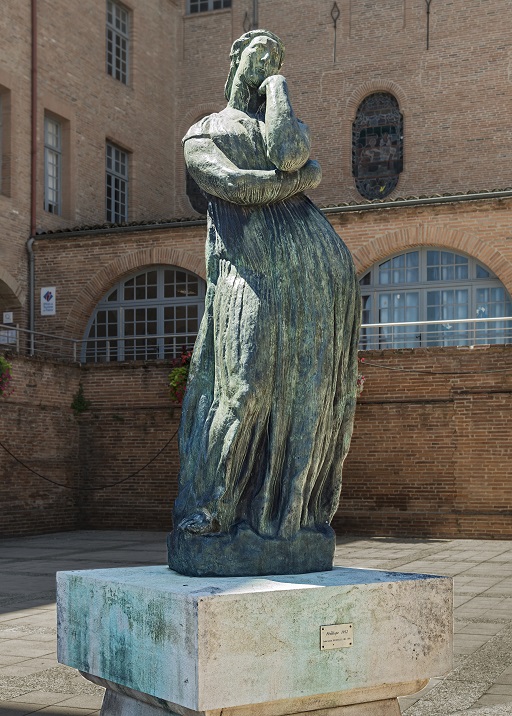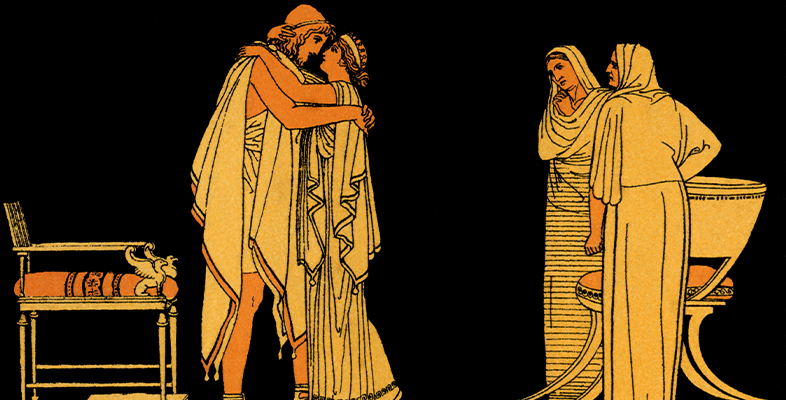3.2 Meeting Penelope
Now you’ll think about how the poet introduces us to Penelope. We don’t meet her until a little later in the first book of the Odyssey, when the poet shows us what has been going on back at Odysseus’ palace on Ithaca during the king’s long absence. At this point in the poem Homer sets a scene where the suitors of Penelope are being entertained in the palace by Phemius, a bard. Bards were skilled singers and musicians, said to be inspired by the gods, who improvised songs based around stories like the ones told in the Homeric poems (indeed, the appearance of bards in the Odyssey might give us an insight into how Homer himself performed his work).

In this scene Phemius is singing a song about the homecomings of the Greeks from Troy. Penelope hears the song and comes downstairs from her rooms to listen; typically in an ancient Greek wealthy household the women would spend most of their time in a more private part of the house, separate from the more public rooms where men would conduct business and receive guests.
Activity 5
Consider the passage below (Odyssey 1.325–336), in which the poet describes Penelope for the first time.
Read it through once without making notes.
The renowned singer was singing to them, and they sat and [325]
listening in silence as he sang of the Achaeans’ return home,
a bitter ordeal, sent them by Pallas Athena after they left Troy.
In her upstairs room the daughter of Icarius, circumspect
Penelope, heard and understood his divinely inspired song,
and came down the tall staircase from her part of the house, [330]
not on her own, but attended by two women servants.
When she, glorious among women, reached the suitors,
she stood next to a pillar supporting the strongly built
roof, holding her shining veil in front of her face, and
a devoted woman servant stood on either side of her. [335]
Through tears she addressed the god-inspired singer:
Then reread the passage as many times as you wish and consider the list of words and short phrases which have been picked out from the text below. Each of these represents an aspect of the way in which the poet describes her character when we first meet her.
Now write a short paragraph (four or five sentences) incorporating those words and phrases, and describing the impression we get of Penelope’s character in this scene. An example sentence about the first one is given to show you an idea.
- ‘circumspect’ (1.328)
- ‘glorious among women’ (1.332)
- ‘holding her shining veil in front of her face’ (1.334)
- ‘Through tears’ (1.334)
Here’s an example based on the first word on the list: ‘The poet’s description of Penelope as “circumspect” (1.328) suggests that she is a cautious character.’
Discussion
Starting with the example sentence given, here is a paragraph based on some of the words and phrases picked out:
The poet’s description of Penelope as ‘circumspect’ (1.328) suggests that she is a cautious character. She is also referred to here as ‘glorious among women’ (1.332), which might indicate that she stands out as being particularly special compared with other women. Although we are not given much information about her appearance, the reference to her ‘holding her shining veil in front of her face’ (1.334) makes her seem very modest, particularly as she is appearing before the suitors who want to marry her. She addresses the bard ‘through tears’ (1.334); the first impression we get of her is therefore of someone who is dealing with grief or sadness.
If you were to read more of the Odyssey you would notice that some of the descriptions of individual characters are used over and over again throughout the poem. For example, Penelope is often referred to throughout the text as ‘circumspect’ (the Greek term used is περίφρων – pronounced periphrōn, with a long ‘o’ sound – which can also be translated as ‘very thoughtful’ or ‘very careful’). These epithets – repeated adjectives or short descriptive phrases – are a feature of Homeric poetry. Along with other formulaic phrases in the text they worked as a memory aid for a poet who was reciting a poem from memory, or improvising on a story and composing new lines as they were performing. They also, however, indicated key attributes of particular characters. Odysseus is often referred to as ‘much-enduring’, ‘much-wandering’, or ‘of many wiles’; all of these phrases capture elements of his character and his experience.
